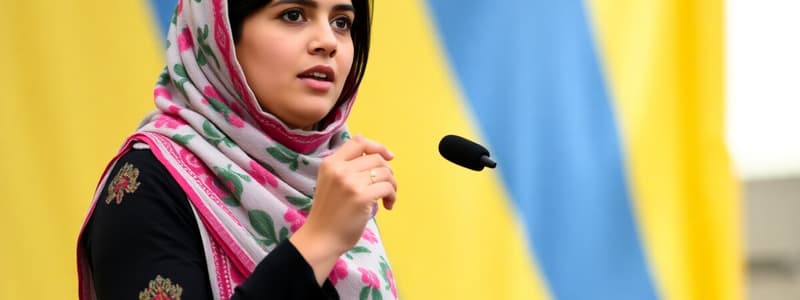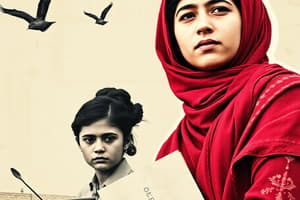Podcast
Questions and Answers
Considering the sociopolitical context described, what rhetorical strategy did Malala employ to amplify the impact of her message beyond the immediate audience at the Khushal School assembly?
Considering the sociopolitical context described, what rhetorical strategy did Malala employ to amplify the impact of her message beyond the immediate audience at the Khushal School assembly?
- Utilizing exclusively Pashto idioms and cultural references to solidify solidarity within her immediate cultural community.
- Employing complex legal arguments to directly challenge the Taliban's legitimacy based on international human rights law.
- Framing her personal experiences as a microcosm of a larger, systemic injustice affecting countless others, thereby universalizing her cause. (correct)
- Adopting a highly academic and theoretical framework to appeal to intellectual elites and policymakers.
Given the environment of fear and oppression described, how did the seemingly simple act of holding a 'peace rally' at Khushal School function as a form of resistance with potentially far-reaching consequences?
Given the environment of fear and oppression described, how did the seemingly simple act of holding a 'peace rally' at Khushal School function as a form of resistance with potentially far-reaching consequences?
- It created a safe space for internal dialogue within the school, preempting any need for external communication or advocacy.
- It directly undermined the Taliban's authority by publicly defying their edicts against female education, catalyzing broader civil disobedience.
- It served primarily as a therapeutic exercise for the students, helping them cope with trauma through collective expression without tangible political impact.
- It leveraged the symbolic power of public assembly to challenge the Taliban's narrative, fostering solidarity among students and attracting media attention, thereby amplifying their message of peace and education. (correct)
In what way does Malala's reference to feeling as though she were 'speaking to the whole world,' despite only addressing local media, reveal a sophisticated understanding of media and its ability to transcend geographical boundaries?
In what way does Malala's reference to feeling as though she were 'speaking to the whole world,' despite only addressing local media, reveal a sophisticated understanding of media and its ability to transcend geographical boundaries?
- It suggests a complete disregard for the importance of local media in shaping immediate community perceptions and attitudes.
- It underscores her prescient awareness of how local narratives, when amplified through media, can resonate globally and contribute to broader sociopolitical discourse. (correct)
- It highlights a strategic manipulation of media outlets to create a false impression of global support for her cause.
- It indicates a naive belief in the power of local media to directly influence global public opinion without strategic amplification.
Considering the cultural milieu described, what complex challenges might Madam Maryam and Malala's father have faced in organizing the peace rally, and how would these have potentially influenced their pedagogical approaches?
Considering the cultural milieu described, what complex challenges might Madam Maryam and Malala's father have faced in organizing the peace rally, and how would these have potentially influenced their pedagogical approaches?
What underlying theoretical framework could be used to analyze Moniba's statement, 'We Pashtuns are a religion-loving people... Our mountains, our trees, our flowers—everything in our valley is about peace,' within the context of countering extremist narratives?
What underlying theoretical framework could be used to analyze Moniba's statement, 'We Pashtuns are a religion-loving people... Our mountains, our trees, our flowers—everything in our valley is about peace,' within the context of countering extremist narratives?
How might the act of looking in the mirror and practicing speeches be interpreted through a psychoanalytic lens, considering the stress Malala was under and the limited opportunities she had for self-expression?
How might the act of looking in the mirror and practicing speeches be interpreted through a psychoanalytic lens, considering the stress Malala was under and the limited opportunities she had for self-expression?
Given Malala's statement, 'This is not the Stone Age... But it feels like we are going backward,' what underlying assumption about the relationship between education, progress, and societal development is being challenged, and what are the broader implications for understanding historical narratives?
Given Malala's statement, 'This is not the Stone Age... But it feels like we are going backward,' what underlying assumption about the relationship between education, progress, and societal development is being challenged, and what are the broader implications for understanding historical narratives?
Considering the sociopolitical environment, how can we understand the significance of the Pashto TV crew arriving at the school assembly, and what potential risks and opportunities did this event present for Malala and her peers?
Considering the sociopolitical environment, how can we understand the significance of the Pashto TV crew arriving at the school assembly, and what potential risks and opportunities did this event present for Malala and her peers?
Given the limited external support and resources available, how might the Khushal School's commitment to being a 'democracy' be viewed as a form of pedagogical innovation and resistance against authoritarianism?
Given the limited external support and resources available, how might the Khushal School's commitment to being a 'democracy' be viewed as a form of pedagogical innovation and resistance against authoritarianism?
In light of the multiple levels of risk—personal, familial, communal—inherent in advocating for girls' education, what specific ethical frameworks might have informed Malala's decisions to speak out, and how might these frameworks have conflicted or aligned with the values of her community?
In light of the multiple levels of risk—personal, familial, communal—inherent in advocating for girls' education, what specific ethical frameworks might have informed Malala's decisions to speak out, and how might these frameworks have conflicted or aligned with the values of her community?
Flashcards
Peace Rally
Peace Rally
An assembly organized to promote peace and express concerns about the Taliban's actions against girls' education.
Moniba
Moniba
A talented public-speaking champion who spoke passionately at the peace rally.
Malala's Speech
Malala's Speech
A powerful speech advocating for girls' education and condemning the Taliban's restrictions.
Fear of Education
Fear of Education
Signup and view all the flashcards
Voice of Many
Voice of Many
Signup and view all the flashcards
Democracy at Khushal School
Democracy at Khushal School
Signup and view all the flashcards
Microphones Effect
Microphones Effect
Signup and view all the flashcards
Chaos at Home
Chaos at Home
Signup and view all the flashcards
Escaping to the Bathroom
Escaping to the Bathroom
Signup and view all the flashcards
Taliban's Campaign
Taliban's Campaign
Signup and view all the flashcards
Study Notes
Malala's Speech
- Malala planned a peace rally with friends at school
- The rally was to address the Taliban's campaign to shut down girls' schools.
- A Pashto TV crew arrived at the rally unexpectedly.
- Malala felt more comfortable speaking in front of a camera as she had done interviews previously.
- The assembly was attended by older girls who spoke first, conveying their fear of quitting school.
Public Speaking Experience
- Malala spoke about how much she loved school and how it was crucial to keep learning
- She declared her fearlessness and stated that they (girls) were not afraid of anyone.
- The girls were determined to continue their education.
- This represented the voice of many others who also wanted to express their opinions.
- The experience felt like she was speaking to the world.
Family Gatherings
- Malala's house was often crowded with relatives from Shangla.
- They visited for healthcare or shopping.
- The house frequently hosted uncles arguing, aunties gossiping, and children playing or crying.
- Malala used the bathroom mirror as an escape from the chaos and would imagine she was being heard by many people.
- Malala's mother's voice brought her back to reality.
Studying That Suits You
Use AI to generate personalized quizzes and flashcards to suit your learning preferences.




